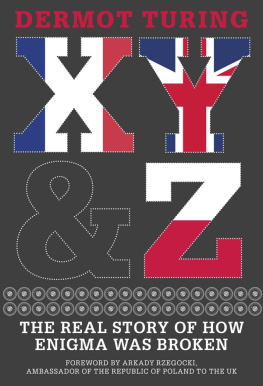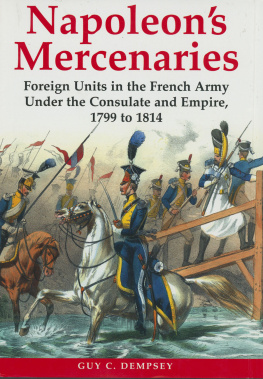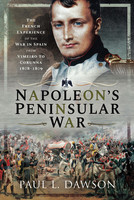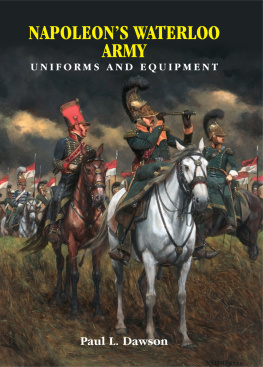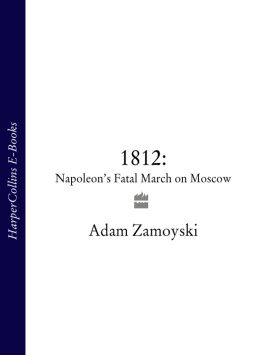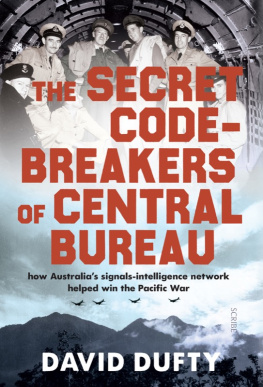THE MAN WHO BROKE

NAPOLEONS CODES
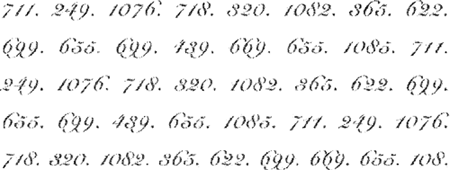
Mark Urban

F OR MY BELOVED M ADELEINE
CONTENTS
B etween 1807 and 1814 the Iberian Peninsula (comprising Spain and Portugal) was the scene of a titanic and merciless struggle. It took place on many different planes: between Napoleons French army and the angry inhabitants; between the British, ever keen to exacerbate the emperors difficulties, and the marshals sent from Paris to try to keep them in check; between new forces of science and meritocracy and old ones of conservatism and birth. It was also, and this is unknown even to many people well read about the period, a battle between those who made codes and those who broke them.
I first discovered the Napoleonic cryptographic battle a few years ago when I was reading Sir Charles Omans epic History of the Peninsular War. In volume V he had attached an appendix, The Scovell Ciphers. It listed many documents in code that had been captured from the French army of Spain, and whose secrets had been revealed by the work of one George Scovell, an officer in British headquarters. Oman rated Scovells significance highly, but at the same time, the general nature of his History meant that he could not analyze carefully what this obscure officer may or may not have contributed to that great struggle between nations or indeed tell us anything much about the man himself. I was keen to read more, but was surprised to find that Omans appendix, published in 1914, was the only considered thing that had been written about this secret war.
I became convinced that this story was every bit as exciting and significant as that of Enigma and the breaking of German codes in the Second World War. The question was, could it be told?
Studying Scovells papers at the Public Record Office (in Kew, west London) I found that he had left an extensive journal and copious notes about his work in the peninsula. What was more, many original French dispatches had been preserved in this collection. I realized at once that this was priceless. There may have been many spies and intelligence officers during the Napoleonic Wars, but it is usually extremely difficult to find the material they actually provided or worked on. Furthermore, Scovells story involved much more than just intelligence work. His status in Lord Wellingtons headquarters and the recognition given to him for his work were all bound up with the class politics of the army at the time. His tale of self-improvement and hard work would make a fascinating biography in its own right, but represents something more than that. Just as the code breaking has its wider relevance in the struggle for Spain, so his attempts to make his way up the promotion ladder speak volumes about British society.
The story of Wellington himself also gripped me. Half a century ago his campaigns were considered a central part of the British historical mythology and spoon-fed to schoolboys. More recently this has not been the case, which is a great shame. A generation has grown up without learning about his battles or indeed his mesmerizing and complex historical character. I therefore felt quite unashamed about giving him a central part in this narrative. One cannot think of a person less in tune with the emotional openness and social inclusiveness of our own time, but his results were spectacular: a paradox that fascinates me. He was certainly one of Britains greatest military leaders, but without doubt one of the most difficult men one could ever have had to work for.
I have written Scovells saga as a story, but the reader should rest assured that nothing significant has been invented to make it a better read. When Scovell is described, for example, as he walks to the top of a lighthouse in Corunna in January 1809 at the very beginning of this book, its not an invention, but comes from a detailed description in his journal. The notes at the end of the book will hopefully provide the curious with a better idea of where much of the material came from. Journals and letters are the main sources for this text, and I have deliberately adopted a writing style that fits in with those sources, avoiding references to phenomena or people unknown in 1809.
Although this may be narrative history, it is still meant to be history and there were many occasions when I resisted the temptation to put thoughts into his head or those of the others in Wellingtons staff. Much of Scovells emotional life remains a closed book to me. His partnership with his wife was a strong one, but, alas, I have not been able to find letters between them or other documents that would really fill out this aspect of the story. Scovells journal barely mentioned her since it concentrates solely on his professional concerns. Similarly, he did not leave us an account of his childhood. It was not poor, we know that, but it was not rich either, and it seems that Scovell regarded his life as a struggle to escape his origins and become a financially independent gentleman.
Did he change the face of history? Its up to the reader to decide. What was important to me was that Scovell did extraordinary work but has languished in obscurity for too long.
One word about style. I have used modern spellings in my own text, but often kept period ones in the quotes, notably when transcribing manuscript sources. Thus, most obviously, the modern word cipher is frequently rendered cypher. While mentioning this frequently used term, it is worth pointing out that the secrets Scovell uncovered were not protected by codes in the strictly defined modern sense of the word. The tables used to convert letters or words into digits are properly called ciphers. I hope cryptographers will permit me the liberty of using the two words codes and ciphers fairly interchangeably in this work: I am doing no more than accepting modern usage. I agreed with the publishers that a book entitled The Man Who Broke Napoleons Ciphers might be misconstrued to be about the humbling of a series of nobodies.
I must of course give thanks to the researchers who assisted me in this substantial task: Helena Braun (for transcribing the journal written in Scovells often painful hand); Roger Nixon (for certain parts of the Scovell family story); Denise Harman and Ronald Rigby (details of the Clowes family) and Cyril Canet, who delved into the French army archives for me. Martin Scovell, a great-great-great-grandson of Georges brother Henry, gave me valuable assistance on their family history.
During my labors the library staff at the Public Record Office, National Army Museum and British Library were indefatigable. Andrew Orgill, librarian at the Royal Military Academy, Sandhurst, was especially helpful. He dug out many interesting items from the papers of Major General John Le Marchant. Mrs. Margaret Richards, the duke of Beauforts archivist at Badminton in Gloucestershire, rallied to my assistance when I belatedly realized what an important source the letters kept there might be. John Montgomery, at the Royal United Services Institute, was also vital to the project, using RUSIs collection and every interlibrary loan imaginable to help. He is also the custodian of the Challis Index, an almost forgotten attempt (by a long-deceased civil servant) at a complete biographical record of British officers serving in the Peninsular War. As can be imagined, it was most useful for checking details of service, dates, etc.
Next page

